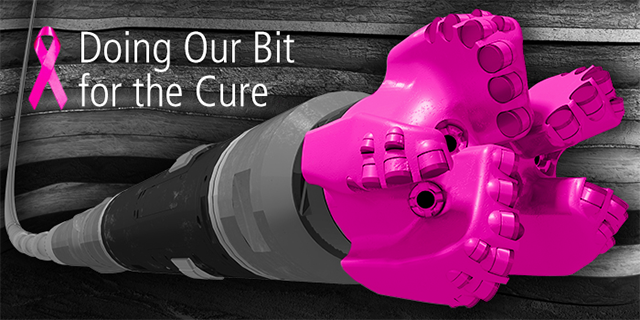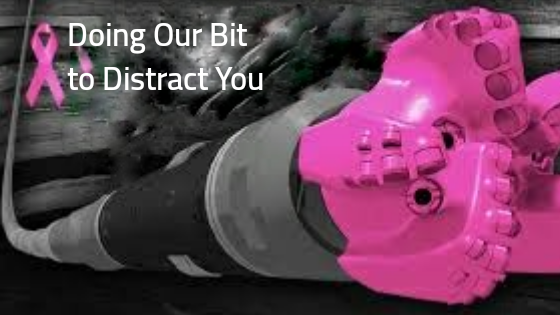Culture Jam
Original:

The Susan G. Komen foundation (formerly known as Susan G. Komen for the Cure) is the largest non-profit breast cancer awareness and research organization in the world, and one of the main forces behind the ubiquitous ‘pink ribbon’ campaigns. Even before I learned about the foundation itself, I knew about the pink ribbon campaign, and have participated in multiple fundraisers and charity initiatives myself throughout my time in elementary and high school. While pink ribbon-branded advertisements and products are numerous, from Blenz coffee cups to special pink Tictacs, the ad I have chosen for my Culture Jam is a partnership between the Komen foundation and Baker Hughes, a General Electric company (known as BHGE) operating in the oil and gas sector. In addition to a $100,000 donation to the Komen foundation, BHGE produced pink drill bits to be used for hydraulic fracturing (fracking) to raise awareness of breast cancer. The partnership also came with the advertisement above, “Doing Our Bit for the Cure”. As a young person concerned about the impacts of fracking on climate change and the environment, from its effects on soil and ground water to the methane flaring that occurs during the process, I was a little in disbelief at the dissonance between the charity’s mission to cure a disease and the idea that pink drill bits are helpful to the cause.
This ad ties into our exploration of intersectionality and interlocking forms of oppression. In my understanding of intersectionality, it is impossible to isolate “purely” feminist issues – they are inextricably tied to issues of race, sexuality, gender presentation, socioeconomic backgrounds, and other facets of people’s identities and lived experiences. With that in mind, I found it unsettling that the Komen foundation is (perhaps inadvertently) supporting harmful environmental activities which often have a disproportionate impact on poor and marginalized communities. A recent study in Science magazine which examined more than 1.1 million birth records in Pennsylvania, found evidence of negative health effects of in utero exposure to fracking sites within 3 kilomtres of the mother’s residence. The environmental justice issues connected to activities like fracking are also very much feminist issues, and cannot be separated from the Komen foundation’s overall mission to help and empower women.
Jammed:

For my jammed version, I made two changes. First, I changed the text to “Doing Our Bit to Distract You” and second, I tried to create a slight image disturbance in the background to represent a methane flare. Burning off excess methane is one of the activities often following hydraulic fracturing, as the methane would be too expensive to store and transport to be used as fuel. Of course, this releases greenhouse gas emissions into the air, which contributes to climate change, but also may contribute to poor air quality for folks living near the flaring sites. The changed text, “Doing Our Bit to Distract You” refers to BHGE donating what really is just a “bit” – $100,000 is very little for a company of that size – towards a good cause, to distract the public from the substance of their activities, which involve enhancing fossil fuel extraction, including hydraulic fracturing.

I also meant to show the ‘pink ribbon’ that also makes up the Komen foundation’s logo as part of the ‘distraction’, in addition to the distraction by BHGE, which is why I kept the ribbon in the image. In my research for this assignment, I gained valuable insight from the work of writer and activist Barbara Ehrenreich, particularly her 2010 piece in The Guardian, “Smile! You’ve got cancer”. In it, Ehrenreich speaks about her journey with breast cancer, specifically the often confusing and isolating experience of taking part in the “cheerfulness” of breast cancer culture. She writes about the pressure for women to be heroic and overwhelmingly positive through their treatment, and her concern about the many entities who aim to cash in on the movement. While finding solidarity in online survivor networks, Ehrenreich also writes about the risk of fully buying in a sugar-coated “pink ribbon culture”, that it can cause women to repress understandable feelings like anger and denial and can cause others to overlook critical issues in women’s health. Ehrenreich concludes that pinkwashing and heroic survivor narratives can perpetuate the harmful idea that there is a right and wrong way to experience breast cancer, and can close off space for diversity and disagreement, which I believe is a valid critique that can be extended to some of the Komen foundation’s work, including this particular pink ribbon partnership.
